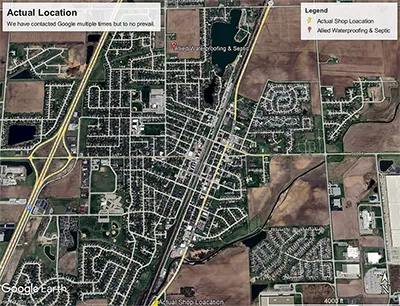
How to Fix Your Water Damaged Foundation Effectively
Experiencing water damage in your home is never a pleasant situation. It can be especially concerning when the foundation of your house is affected, as this is a crucial structural component that ensures the stability and integrity of your entire dwelling. Foundation water damage problems should never be ignored. This article discusses various ways that water can damage your home’s foundation and the steps you can take to address these issues effectively.
Understanding the Impact of Water Damage Foundation Problems
Before exploring solutions, it’s crucial to understand how water can wreak havoc on your foundation. Foundations, regardless of whether they’re made of poured concrete, concrete block, or brick, are porous to some degree. This means they can absorb water, especially when subjected to excessive moisture for extended periods.
When this absorbed water freezes during colder months, it expands, leading to foundation cracks, fissures, and other structural damage that can compromise your foundation’s integrity. If you have basement water, this could be a cause.
The Perils of Hydrostatic Pressure
One of the most common ways water can cause serious damage is through hydrostatic pressure. This happens when water collects in the soil surrounding your foundation. This accumulation exerts constant pressure against the foundation walls.
Over time, even the sturdiest foundations can begin to crack, bow, or shift under this unrelenting pressure. Volume increases of water against your foundation puts stress on the concrete foundation. Signs that hydrostatic pressure might be affecting your foundation include horizontal cracks in your basement walls, water seepage, and dampness.
Expansive Soils: A Recipe for Foundation Trouble
The type of soil beneath and around your home plays a critical role in its susceptibility to water damage. Certain types of soil, known as expansive soils, are notorious for their tendency to expand and contract significantly based on moisture content. Expansive soils expansive soils are not good for a house foundation.
When these soils absorb water, they swell and exert immense pressure against your foundation. Soils being expansive soils can damage your home’s foundation. Conversely, they shrink when they dry, creating gaps and voids that can lead to foundation settlement. If your house sits on expansive soils, it’s essential to have proper drainage and take steps to manage soil moisture.
The Silent Threat of Erosion
While hydrostatic pressure and expansive soils often grab the headlines regarding foundation problems, erosion shouldn’t be overlooked. Erosion happens when water gradually carries away soil particles around and beneath your foundation, creating voids that can lead to uneven settlement.
Poor drainage, leaking pipes, and inadequate gutters are common culprits behind erosion-related foundation damage. Heavy rain can be a cause of erosion, too. You may need foundation repairs.
Recognizing the Telltale Signs
Detecting water damage foundation issues early can make a significant difference in mitigating further damage and reducing repair costs. Be vigilant for these warning signs:
Cracks: Keep a close eye on both interior and exterior walls, especially in your basement. Look for horizontal, vertical, diagonal, or stair-step-shaped cracks, which could indicate foundation movement. Large cracks in your foundation are an obvious sign.
Sticking Doors and Windows: Difficulty opening and closing doors or windows can signal foundation shifting caused by soil movement.
Gaps Around Window or Door Frames: Gaps, particularly at the top or bottom of these frames, might indicate movement in the structure.
Uneven Floors: Sloping or uneven floors, especially if you notice a bouncing or springy feeling when you walk, could point to foundation issues.
Water Seepage: Damp spots, mold growing, or a musty odor in your local basement can all signal excessive moisture. You might have a water leak.
Cracked Concrete Floors: While concrete is incredibly strong under compression, it is weaker under tension. Therefore, cracks appearing in a concrete floor often point to a flexing of the concrete that occurs from excessive weight or pressure being applied over a short period of time, or from movement of the soil that supports the slab.
Exterior Signs: Look for signs of foundation issues outside, including cracks in brickwork, separation between walls and the foundation, or visible tilting of the structure.
Addressing Water Damage Foundation Issues
While encountering these signs can be disconcerting, addressing water damage foundation issues effectively involves a combination of repair and prevention strategies:
Seek Professional Intervention
It’s highly recommended to consult with an experienced foundation repair professional when you suspect foundation issues. You’ll want to contact a foundation repair company if you need foundation repairs. Attempting DIY repairs can sometimes exacerbate the problem. It’s always best to get professional intervention.
A qualified foundation professional can properly assess the damage, determine the underlying causes, and recommend the most appropriate repair methods, such as:
Implementing Preventive Measures
Once your foundation is repaired, taking steps to prevent future water damage is paramount:
Manage Drainage: Ensure your gutters are clean and free of debris to direct water away from your foundation. Extend downspouts at least five feet from the house. Cleaning gutters can help prevent water damage. Consider installing French drains or grading the landscape to channel water away from the foundation.
Control Soil Moisture: Maintain consistent soil moisture around your foundation by watering during dry periods and addressing any drainage issues promptly. This will prevent soils expansive soils from expanding. Avoid planting trees or shrubs too close to the house, as their roots can seek out water and cause damage. Tree roots can cause serious damage.
Repair Leaks: Address plumbing leaks immediately, no matter how small they may seem. Regularly inspect pipes, faucets, and appliances for signs of leaks and get them repaired as needed. A sump pump can help if you are having issues with water lines.
Waterproof Your Basement: Waterproofing your basement from the inside and out can help prevent water intrusion and mitigate damage from hydrostatic pressure. This may include applying sealant to the walls, installing a drainage system, or encapsulating the crawl space. Basement waterproofing is a great way to prevent water damage we’re talking about in this article.
Regular Inspections: Make it a habit to inspect your foundation and basement regularly for any signs of moisture, cracks, or other problems. Early detection can save you from more extensive and costly repairs later on. Look for obvious signs you have foundation water damage.
Wrap-Up: How to Address Water Damage Foundation Issues Efficiently
Protecting your home from water damage foundation problems requires a proactive approach that combines prompt repairs with effective prevention strategies. If your home’s foundation requires repair, it is important to hire a reputable foundation repair company. Damaged water to your foundation is a serious issue. Regular maintenance, addressing drainage issues, knowing the warning signs of trouble, and how heavy rains can affect your home are vital.
Remember, when it comes to your home’s foundation, it’s always best to consult with an expert to receive professional guidance and ensure your home remains safe and secure for years to come. If you have water-damaged foundation issues, you will want to seek professional intervention. A foundation repair professional will be able to properly assess the situation.
Press Releases
Allied Water Services Announces Strategic Partnership with Norweco to Supply High-Quality Septic Tanks to Industry Professionals
- Business Wire
February 04, 2025
MANTENO, Ill.--(BUSINESS WIRE)--Allied Water Service, a leader in septic, sewer & waterproofing solutions, is proud to announce an exclusive partnership with Norweco, a globally recognized manufacturer of advanced wastewater treatment systems.
Read More
Allied Water Services Announces Strategic Partnership with Norweco to Supply High-Quality Septic Tanks to Industry Professionals
- Yahoo Finance
February 05, 2025
MANTENO, Ill. Allied Water Service, a leader in septic, sewer & waterproofing solutions, is proud to announce an exclusive partnership with Norweco, a globally recognized manufacturer of advanced wastewater treatment systems.
Read More
Allied Water Services Announces Strategic Partnership with Norweco to Supply High-Quality Septic Tanks to Industry Professionals
- Yahoo Finance
February 04, 2025
MANTENO, Ill.--(BUSINESS WIRE)--Allied Water Service, a leader in septic, sewer & waterproofing solutions, is proud to announce an exclusive partnership with Norweco, a globally recognized manufacturer of advanced wastewater treatment systems.
Read More
Allied Water Services Announces Strategic Partnership with Norweco to Supply High-Quality Septic Tanks to Industry Professionals
February 04, 2025
MANTENO, Ill.--(BUSINESS WIRE)--Allied Water Service, a leader in septic, sewer & waterproofing solutions, is proud to announce an exclusive partnership with Norweco, a globally recognized manufacturer of advanced wastewater treatment systems.
Read More




Hours:
Mon - Fri 9:00 am - 5:00 pm
Extended hours by appointment only.







